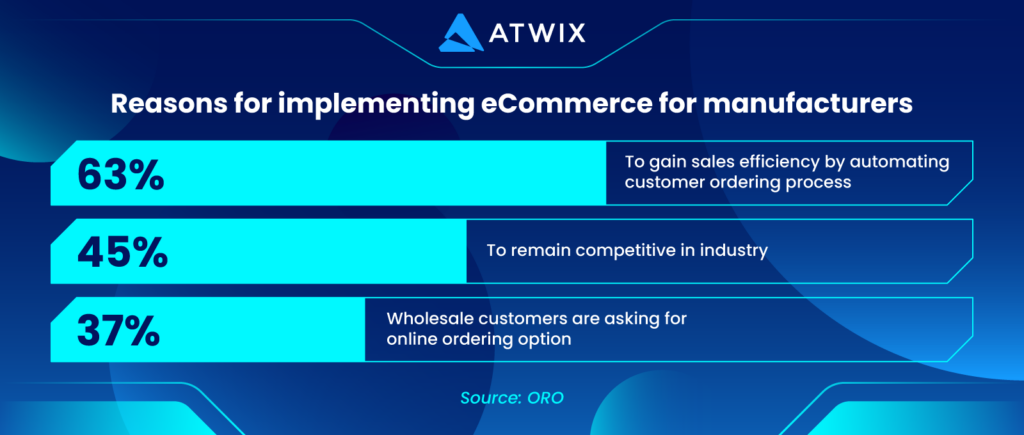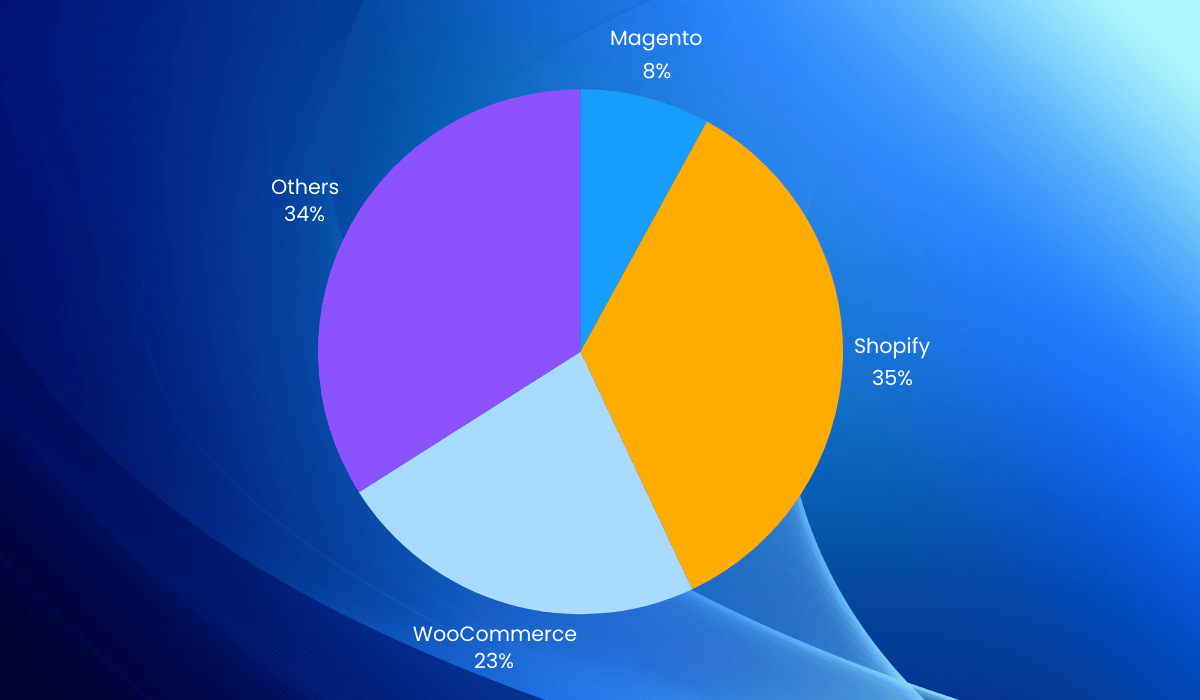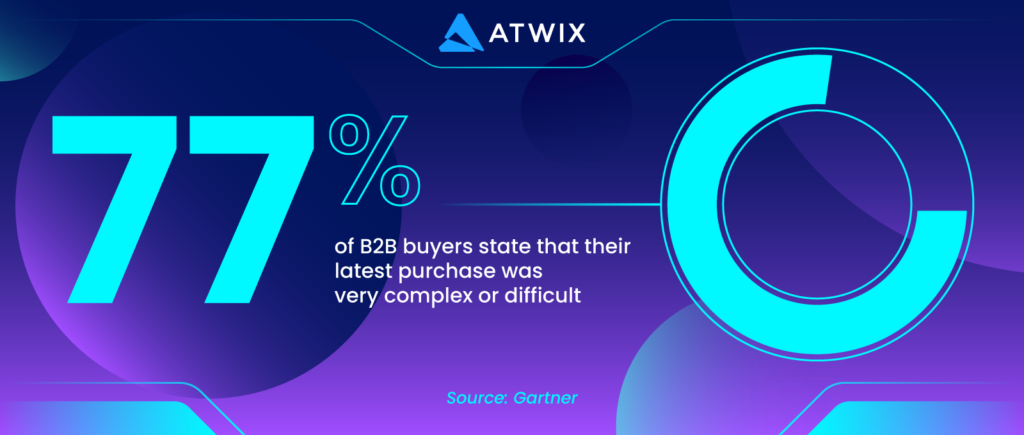In recent years, the rules of the global trade game have changed, encouraging the implementation of B2B eCommerce for manufacturers.
First COVID-19 has made all brick-and-mortar stores stall, forcing all businesses to move online. Then, the behavior of B2B customers has changed, them expecting the same level of service as B2C buyers and enjoying purchasing from digitally innovative suppliers.
Thus, if you want to level up and secure your company, B2B eCommerce solutions for manufacturers are the way out.
In this article, you’ll see the best ecommerce platform for manufacturers, learn from the experience of famous manufacturers, and find out how to choose the right partner for implementing digital solutions.
Now, let’s get down to business.

B2B eCommerce Solutions for Manufacturers
Not every eCommerce platform can meet the specific needs of manufacturers. When making B2B sales, suppliers should be able to offer personalized pricing, issue invoices, provide more advanced product information, and others.
If you want to avoid the hassle of searching, use our list of the best B2B eCommerce platforms for manufacturers with all the necessary functionality.
1. Magento/Adobe Commerce

Global Market Share of eCommerce Platforms
Magento boasts its open-source nature, allowing full code customization for complete flexibility and control over your online store. The platform supports various product types and large product catalogs, making it a well-suited b2b ecommerce platform for manufacturers seeking to easily configure and sell a diverse range of goods. The platform also offers robust roles and permissions B2B features, efficiently managing assigned roles.
On the side note, you might need to hire a professional Magento development agency to implement the B2B eCommerce solutions.
Coca-Cola, Hugo Boss, and Cisco have chosen Magento for their growth.
2. Virto Commerce
The cloud-native platform is designed with a strong emphasis on B2B commerce, offering the possibility to set up custom pricing and allowing for adaptable role-based management. You can customize it according to your business model, from quotes and subscriptions to reordering and contract-based invoicing.
An API-first architecture makes Virto Commerce a comfy B2B ecommerce platform for manufacturers. You can integrate it easily with any ERP and CRM systems to streamline your operation and improve data consistency.
Heineken and Flokk are famous brands using this platform.
3. Shopify Plus
As a SaaS platform, Shopify Plus is popular among the manufacturers for its simplicity and usability. It allows for the creation of customer-specific pricing, automated payment, and a streamlined checkout process.
Your customers can easily manage their accounts, access order history, and make payments through self-service options. These features enhance efficiency and customer satisfaction in B2B transactions.
Bols, Castañer, Desky, Heinz, and Van Compass are just a few of the hundreds of companies using Shopify Plus.
4. Sana Commerce Cloud
Sana offers compelling benefits for B2B eCommerce for manufacturers, seamlessly integrating with ERP and creating an efficient ecosystem for process management. A decoupled front- and back-end, built on a React framework, makes the platform super flexible and easily customizable.
You can offer personalized pricing and manage complex product catalogs. Moreover, Sana Commerce Cloud boasts high-speed page performance, improving user experiences.
K-Rain, TreeLocate, United Pacific Industries, and Story Fresh are famous manufacturers that prefer this platform.
5. GOb2b
GOb2b makes it easier to manage and offer personalized pricing to different clients. The platform provides tools for client communication, including order status updates, notifications, and messaging.
The mobile accessibility of GOb2b ensures that manufacturers and their clients can access the platform from anywhere, providing flexibility for on-the-go businesses.
Yokohama Tyres, Ultimate Sports Engineering Ltd., Viatek Limited, and Falcon Products have already implemented GOb2b in their commerce.
6. Acenda
Acenda is a cloud-based eCommerce platform for manufacturers that embrace a direct-to-consumer approach. It offers a robust and user-friendly CMS that enables efficient loading and organization of product data.
The platform helps suppliers integrate with major marketplaces and retailers. You can sell your products across Amazon, Walmart, eBay, Target, Bed Bath & Beyond, Costco, and others.
7. Salesforce
B2B eCommerce for manufacturers can be easy with this cloud-based platform. You can benefit from flexible price management and automated reordering with AI for registered customers.
Additionally, Salesforce provides enhanced inventory visibility, enabling real-time tracking of available stock, which is especially valuable during peak sales periods.
Ovation Medical is one of the manufacturers that has boosted their business with Salesforce Commerce Cloud.
8. BigCommerce
For manufacturers seeking an effective B2B accessories commerce platform, this cloud-based eCommerce can become a suitable option. BigCommerce allows for creating price lists, product catalogs, and customer groups.
The platform provides an invoice portal along with multiple payment options, simplifying the billing process for customers. They can conveniently view, manage, and pay their invoices online.
Expresso, Gesswein, Moore Brothers Wine Company, USCutter, and others benefit from BigCommerce.
9. Oracle Commerce Cloud
One key feature of this platform as B2B eCommerce for manufacturers is API-first extensibility, simplifying third-party software integration. Additionally, Oracle provides advanced features such as product catalogs and merchandising.
Oracle supports product configuration and pricing and facilitates omnichannel fulfillment. Thus, clients can choose such options as buy online and pick up in-store (BOPIS) or click-and-collect.
Zebra Technologies, Beyonics, and Fine Hygienic Holding prefer Oracle Commerce Cloud.
10. commercetools
Its microservice architecture empowers manufacturers to deploy, modify, and manage various commerce services independently. It enhances website response speed and improves system reliability while reducing maintenance costs.
commercetools boasts extensibility and integration through robust APIs, enabling seamless connections with third-party software.
Normet, Tamron, and JSW One are manufacturers that use commercetools.
Benefits of Ecommerce Platform For Manufacturers
Awareness of the various platform technical features is great, but is it worth going B2B eCommerce for manufacturers? Let’s figure out what you get by having an online store with enhanced possibilities.
1. Reach a wider audience
There are no geographical boundaries for eCommerce. Business buyers from all over the world can purchase your products without having to visit physical stores.
Besides, the digital market is open 24/7, so customers can make purchases even at night. The eCommerce platform integrated with inventory systems automatically generates orders and invoices. It also makes the website accessible to buyers in different time zones.
2. Increase sales
A larger audience already means more revenue, but that’s not all. According to The B2B Future Shopper Report 2023, 68% of B2B buyers are planning to increase their use of digital shopping channels in the future. This shift is reflected in the revenue growth of manufacturers who have embraced eCommerce. In 2023, B2B eCommerce sales for manufacturers continued to grow, reaching significant milestones and underscoring the importance of a strong eCommerce platform for manufacturers.
The latest data shows that B2B digital commerce among manufacturers is projected to keep rising, as more businesses recognize the necessity of digital transformation. Companies that effectively integrate digital tools and platforms into their operations are better positioned to capture this growing market share.
By prioritizing digital innovation, manufacturers can meet the evolving demands of B2B customers and remain competitive in an increasingly online marketplace. The right eCommerce platform can enhance user experience, streamline purchasing processes, and ultimately drive higher sales and revenue.
3. Improve customer service
The profile of the B2B buyer interacting with manufacturers has changed. The Wunderman Thompson B2B Future Shopper report shows that 67% of B2B buyers start their purchase journey online. Thus, you should provide them with an excellent shopping experience to make them buy from you.
Today, B2B buyers expect to receive the same level of service as B2C customers. They want to receive answers to their questions, get additional information, and close deals quickly. B2B eCommerce for manufacturers makes this possible by automating these processes and providing real-time support.
In fact, improving the customer buying experience of your business is crucial. 66% of global B2B buyers told Wunderman Thompson that the service they get is more important than the B2B brand or company they buy from.
4. Reduce costs and prevent loss
Automated purchase processing reduces the need for manual data entry and order verification. Thus, you can cut labor expences. Moreover, eCommerce allows for better inventory management, which minimizes the cost of storing and transporting excess products.
A B2B eCommerce platform allows manufacturers and distributors to sell goods all over the world without the need to open additional offices. Besides, you can also save on digital marketing and SEO to promote your company.
Moreover, the COVID-19 pandemic has shown that the physical market can easily drop while online stores thrive. According to the Deloitte industry outlook, manufacturers with higher digital implementation can better overcome risks during uncertain periods. Moreover, digital capabilities can help to secure profitability.
5. Gain insights into customer behavior
eCommerce platforms provide robust data analytics capabilities. You can analyze website traffic, sales patterns, and buyer interactions and understand how clients navigate your online store.
Customer purchase history allows manufacturers to find out which products are most popular. Moreover, reviews and ratings provide valuable insights into product satisfaction and areas for improvement.

Case Studies: Examples of B2B eCommerce Implementation by Manufacturers
The experience of global manufacturers confirms the positive impact of eCommerce on revenue growth and customer satisfaction. Let’s explore some success stories.
Byrne
Byrne, a leading manufacturer of electrical components, was frustrated with their outdated technology and its limitations. They wanted to maintain outstanding user experiences while offering advanced order management and customization capabilities.
Atwix helped them address their B2B eCommerce challenges in only 8 weeks. Byrne got the selling non-catalog products functionality, 360 Product View images for informed purchases, and higher site speed with Magepack and Fastly integration.
After the successful launch, Byrne enhanced productivity and customer satisfaction and paved the way for future digital transformation.
TACO Metals
TACO Metals, a prominent marine industry manufacturer, faced problems managing projects using different online and offline systems. They needed a single system to handle dealers, distributors, and customers. Moreover, their existing website didn’t bring in sales.
After implementing an eCommerce solution, TACO Metals got a new website that combined online shopping and content management. This allowed them to sell products to different groups, store marketing materials, and reach more customers with information.
As a result, TACO Metals saw a 30% increase in revenue, faster operations, and lower costs.
K-Rain
K-Rain, a global manufacturer of sprinkler and irrigation systems, understood that the current eCommerce platform couldn’t support their evolving business needs. Their teams were struggling with too much data and the maintenance of their web store.
They wanted to get support for complex and customer-specific pricing, intuitive content management, secure web storage, and more. The manufacturer ended up launching two web stores: one for customers and another for their distributor network.
The new eCommerce solution helped them to get a 25% boost in sales and a 100% jump in YOY web traffic.
How to Choose the Right B2B eCommerce Partner?
The success of your future online business depends on the right choice of a B2B eCommerce partner. Use the following guide with the main criteria to make sure the target is met.
- Experience. Start by assessing their expertise in B2B eCommerce for manufacturers. Explore their cases with similar businesses to understand their expertise in your industry.
- Scalability. Your partner should offer a platform that can grow with your business and handle increased traffic and transactions as your company expands.
- Integration capabilities. The chosen developers should know how to seamlessly integrate the eCommerce platform with your existing systems, such as ERP and CRM, to optimize processes and data management.
- Customization. The appropriate eCommerce solution should align with your specific needs. Look for a partner experienced in delivering B2B eCommerce for distributors, ensuring tailored solutions for your supply chain operations.
- Support. Ensure your partner has a track record of providing excellent technical assistance and updates, as ongoing help is vital for a smooth operation.
- Price. Finding a partner whose pricing aligns with your budget without compromising on quality is vital.
Implement eCommerce and boost your business growth
Reach out to Atwix to find out the array of solutions we have for you.

Atwix is your trusted development agency and by far one of the best ecommerce platforms for manufacturers meeting all of the criteria above! With over 17 years of expertise in implementing B2B eCommerce solutions, the company focuses on Magento/Adobe Commerce, one of the top 10 platforms in the industry.
Being one of the most certified Magento Professional Solution Partners, Atwix has made more improvements and bug fixes for Magento than anyone else from 2018 to 2023.
Read also: Migrating to Magento 2
After implementing eCommerce solutions, Atwix keeps providing support to ensure that the Magento store stays safe, fast, and up-to-date. Thus, your website brings only an enjoyable shopping experience for your customers. Find more details on Atwix services here.
The Bottom Line
Let’s summarize why manufacturers should consider implementing B2B eCommerce solutions. They can help your company to:
- Reach a global audience and increase profit
- Keep pace with global trade development
- Improve B2B customer shopping experience
- Automate workflows and reduce costs
- Enhance your company’s reputation
- Secure your manufacturing business from uncertain periods
Seize the chance to boost your growth. If you still have any questions about B2B eCommerce for manufacturers, claim a consultation with Atwix. We are eager to share our expertise with you and estimate a project if needed.
Frequently Asked Questions
Got some questions? We’re here to answer. If you don’t see your question here, drop us a line with out Contact form.
Why B2B eCommerce for Manufacturing?
eCommerce solutions empower manufacturers to expand their reach, meet the evolving demands of modern B2B buyers, and stay competitive in a digital-first market. They enable manufacturers to enhance customer experiences, streamline operations, and improve efficiency through automation and integration with existing business systems. By adopting eCommerce, manufacturers can also future-proof their businesses against market uncertainties.
How much does a B2B eCommerce solution cost?
The cost of a B2B eCommerce solution depends on several factors, such as platform choice, complexity of features, level of customization, and integration requirements. Small businesses might find SaaS solutions more cost-effective, while larger enterprises may need tailored solutions with higher investment. Contact us for an accurate estimate based on your unique business needs.
How do I implement a B2B eCommerce solution?
Implementing a B2B eCommerce solution involves selecting the right platform, defining your business requirements, integrating with existing systems like ERP or CRM, and customizing features to align with your operations. Partnering with an experienced eCommerce agency ensures a smoother implementation, from setup and configuration to ongoing support, minimizing risks and maximizing ROI.
What are the key benefits of integrating ERP with a B2B eCommerce platform?
Integrating ERP with a B2B eCommerce platform ensures real-time synchronization of data, such as inventory levels, order statuses, and pricing. This integration reduces manual data entry errors, improves operational efficiency, and provides customers with accurate and up-to-date information. Additionally, it streamlines workflows, enhances decision-making through consolidated data, and improves customer satisfaction with seamless processes.
Can B2B eCommerce solutions help manufacturers personalize the buying experience?
Yes, B2B eCommerce solutions provide tools for personalizing the customer journey, such as dynamic pricing, tailored product catalogs, and account-specific promotions. Advanced platforms allow manufacturers to create unique shopping experiences based on customer preferences, purchase history, and buying behaviors. This personalization not only boosts customer loyalty but also drives higher conversion rates and repeat business.
